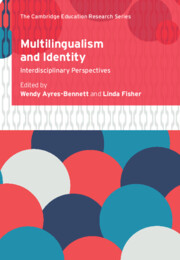Book contents
- Multilingualism and Identity
- Multilingualism and Identity
- Copyright page
- Contents
- Figures
- Tables
- Contributors
- 1 Towards Interdisciplinarity in Multilingual Identity Research
- Part I Situated Multilingualism and Identity
- Part II Multilingual Identity Practices
- Part III Multilingual Identity and Investment
- 13 Multilingualism(s), Globalization and Identity
- 14 Who Are the Multilinguals?
- 15 Multilingual Identity Construction through Participative Reflective Practice in the Languages Classroom
- 16 Young Children’s Language Attitudes with Implications for Identity in a US Dual-Language Immersion Classroom
- 17 Language, Identity and Empowerment in Endangered Language Contexts
- 18 Afterword
- References
- Index
15 - Multilingual Identity Construction through Participative Reflective Practice in the Languages Classroom
from Part III - Multilingual Identity and Investment
Published online by Cambridge University Press: 22 July 2022
- Multilingualism and Identity
- Multilingualism and Identity
- Copyright page
- Contents
- Figures
- Tables
- Contributors
- 1 Towards Interdisciplinarity in Multilingual Identity Research
- Part I Situated Multilingualism and Identity
- Part II Multilingual Identity Practices
- Part III Multilingual Identity and Investment
- 13 Multilingualism(s), Globalization and Identity
- 14 Who Are the Multilinguals?
- 15 Multilingual Identity Construction through Participative Reflective Practice in the Languages Classroom
- 16 Young Children’s Language Attitudes with Implications for Identity in a US Dual-Language Immersion Classroom
- 17 Language, Identity and Empowerment in Endangered Language Contexts
- 18 Afterword
- References
- Index
Summary
This chapter explores how participative reflective practice in the languages classroom facilitates multilingual identity development. We appraise constructs such as metacognition, sociolinguistic competence, language awareness and identity’s place in education generally, and languages education specifically. On these theoretical bases, we present an innovative identity-driven pedagogy entitled 'We are multilingual', which aims to raise learners’ awareness of language- and sociolinguistics-related issues and create a space for learners to understand and acknowledge their existing multilingual repertoires, and those of others. The goal is for learners to reflect on new language-related knowledge, to relate it to their own lives and future goals, and to offer learners agency to identify as multilingual if they so wish. The pedagogical content, example activities and teacher comments are included. Finally, we emphasise the importance of embedding personalized identity-based reflection into languages education, particularly in Anglophone contexts, where language learners often see themselves as monolingual, and where language learning has commonly suffered from low uptake and interest.
Keywords
- Type
- Chapter
- Information
- Multilingualism and IdentityInterdisciplinary Perspectives, pp. 299 - 320Publisher: Cambridge University PressPrint publication year: 2022
- 2
- Cited by



